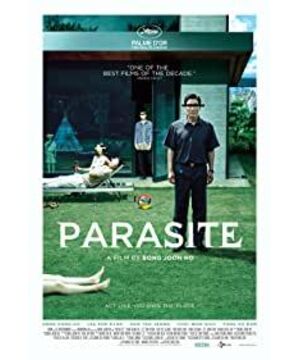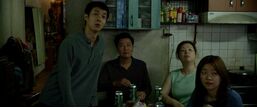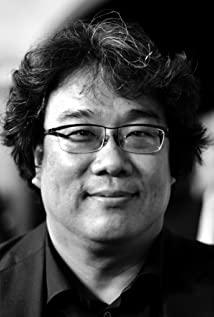Not surprisingly, "Parasite" triggered a movie earthquake. Whether it is the discussion of resource subtitles or the subsequent movie-watching boom, this small-scale anxious carnival has made me, a self-proclaimed movie fan, a sense of fulfillment and satisfaction. The same feeling was experienced when "Burning" debuted last year, and of course it may not be so strong.
As a Korean film selected for the Cannes main competition in the past two years, the comparison between "Parasite" and "Burning" seems to be something that many fans and friends who have watched the two films are happy to do. It is true that the two films are comparable. In addition to the film festival competition experience (especially considering the final completely different awards), there are also references to the difference between the rich and the poor, the exploration of film semiotics, and so on. Considering the fact that I am limited, I will only discuss the (arguably) surreal scenes at the end of the two films.
In "Parasite", when the whole story settles, the mystery of the father's disappearance is also solved with the content of the letter after the son's decoding, and then Bong Joon-ho sets an ending for the audience: his son Ji-woo wrote a letter to his father Letter, in conjunction with the son's narration, we saw that a well-dressed Ji-woo bought the house a few years later, enjoyed the sunshine in the courtyard with his mother, and hugged his father who came up from the cellar, and then the camera cut to the cold winter Ki Woo in the basement, the movie ends.
This seems to be a very common setting for a commercial film. When the protagonist is repressed in reality, he can only hope for the next life through surreal imagination. This is also a way for the director to let the audience continue to have hope. Different from ordinary commercial film directors, Feng Junhao still has unique design in this short clip, mainly in two points.
One is the problem of fixing the stone. At the beginning of the surreal scene (which can also be regarded as the beginning of Ji Woo's dream), Ji Woo's subjective shot appeared. He put the rock that appeared repeatedly in the film into the stream. This stone is undoubtedly a very important image in the movie. There may be many understandings. Considering that in the scene in which the rainstorm flooded the basement, Ki-woo picked up the stone floating in the water, I would like to understand it as Ki-woo’s class attributes. Concerns. So in the ending scene, the imaginary Ki Woo let go of this worry, so he crossed the class without hesitation. I think this is very clever in the surreal scene. Because we know that the stone has disappeared since the scene where the servant’s husband smashed Ji Woo, it is difficult to write it back in the real story. But as an important object that almost runs through the entire movie, it is necessary to set a final destination for it. The surreal footage solves this problem well, and this abstraction echoes with what the stone itself symbolizes. Even more mysterious, I think the weight of this stone is different in different paragraphs. Of course, this has nothing to do with the focus of my current discussion. If you are interested, you can think about it.
The other is the completion of the arc of the father's character. Here we must first explain the concretization of the lower class leap. In this surreal segment, the son Ji Woo (and mother) successfully achieved a class leaping and finally bought the villa, but this leaping process is abstract, and is expressed through his son's life plan. In contrast, the father’s class leap is concrete, that is, he walks up from the cellar. A similar setting appeared in the previous episode. The servant wanted to report the truth to his wife from the cellar, but was kicked by Ki-woo's mother at the exit. That is to say, the class leaping that the servant family did not achieve, the father has achieved.
Then let us take a systematic look at the character of the father. He started to be very useless and indifferent when someone came to pee at the door of the house. Later, I got a job under the plan of my sons and daughters, and I was full of respect for President Park's family (for comparison, the servant’s husband was at this stage until his death). Then because of the detail of smell, his father's dignity gradually collapsed, and he finally committed a crime, shutting himself in the cellar in order not to be judged. The plot developed to this point, and my father seemed to be permanently imprisoned at the bottom of the class pyramid. It was the last surreal passage that allowed my father to achieve a class leap and complete the character arc. However, the most ingenious thing about surrealism is that all of this is fake. At the end of the film, Bong Joon-ho gave the shot to his son who was sitting in the basement in the cold winter. Everything in front of him was nothing but the fantasy of his son Ji-woo. Reality slapped those who were trying to cross classes. The sharp contrast between this despair and the looming hope in Ji Woo's eyes was expressed through the last shot of the film left to the audience.
In general, the surreal passage set by Bong Joon-ho for the end of "Parasite" is very functional, or it tends to be closed, whether it is a character (father) or a thing (stone). The respective endings. In a sense, this is what a good commercial film should have, it can meet the expectations of the audience, and it can also end the whole work. So what did Li Cangdong do in "Burning"?
At the end of "Burning", after so many things, Li Zhongxiu, played by Liu Yaren, already had his own answer. He asked Ben directly, murdered him, and put the body and his clothes back into Ben's luxury car. I set a torch and finally drove away against the flames of the cold winter, and the movie ended.
I want to add a sentence here, because personally, this segment of "Burning" is extremely shocking, and this kind of enjoyable movie-watching experience even exceeds the highly respected sunset dance in front of the movie. In contrast, "Parasite" most shocked me not the surreal ending, but the previous clip of the father's murder of President Park. So compared to the two surreal scenes, it is actually a judgmental decision for me. I can only try my best to maintain the so-called objective rationality to discuss.
Going back to this segment of "Burning", what I was most interested in watching the movie was its authenticity. In the previous episodes, we clearly felt Li Zhongxiu's suspicion of Ben. In his opinion, Ben may be a perverted murderer, and Huimei is probably the one who killed him. In this way, it seemed reasonable for Zhong Xiu to avenge Huimei in this way in the end. But think about it again, this is different from Zhong Xiu's persona. Not only because he, as a loser writer, was afraid of such a rich man as Ben ("Parasite" tells us that momentary emotional outbursts will not be affected by class differences), but more importantly, Zhong Xiu was a man who confirmed that the warehouse was burned. Looking for people who are several kilometers away, would such a person kill Ben because of suspicion with a bit of imagination? Based on these two points, I judge this ending to be surreal, and this kind of thoughtful viewing experience can be said to be extremely enjoyable.
However, I don't know if Li Cangdong is worried that the work is too obscure, but he still sets clues in the movie. Before the beginning of the aforementioned ending, there was a shot of Li Zhongxiu sitting in front of the window typing. This shot is directional, implying that the plot behind it is the content of Zhong Xiu's novel. In other words, this also made sure that what happened later was surreal. I always feel that the typing scene is questionable. If it is removed, it will make more sense for the audience to see the authenticity of the ending based on their own understanding.
The things in this surreal clip are extremely informative. There are emotional expressions of Zhong Xiu and Ben (the embrace at the time of murder), and the thinking caused by Zhong Xiu’s entire behavioral logic, especially the correspondence between burning a warehouse and burning a luxury car. The idea of the film goes beyond simple jealousy and revenge, and also goes beyond the differences and opposition between the rich and the poor. At that moment, Ben's value system for morality and life had been passed on by Zhong Xiu. He even gave up looking for a warehouse and created a "warehouse" by himself. Of course, this is only my limited understanding. There have been too many discussions on "Burning", and there is no shortage of such a superficial one. I just want to say that the ending of the surreal segment of "Burning" transcends simple functional categories and tends to be open, and people can have endless imaginations about it (not limited to authenticity). To some extent, this is consistent with the ambiguity expressed in Haruki Murakami’s original work, and a film that can express the mystery and ambiguity in literature is really rare. Masterpiece.
To sum up, I think comparing these two surreal clips can see the difference between "Parasite" and "Burning" to a certain extent, the difference between Feng Junhao and Li Cangdong, and the difference between commercial films and literary films. Personally, I like both of these movies (both given five stars). "Burning" is the kind of film that will keep thinking and thinking after watching: What is the role of the image of the cat? What does a warehouse really mean? The story structure and scene scheduling of "Parasite" allowed me to enjoy the whole movie watching process. It was a pity that I couldn't see the big screen.
When I was wrangling with my friends at the North Film Festival this year, I said that I only recognize Lee Cangdong as a Korean film master, and if I have to count, I will add a Hong Sangxiu. Then Cannes immediately gave Feng Junhao a Palme d'Or in response to my nonsense. In fact, the question of who is the master is really hard to say, but what is certain is that Bong Junho and Lee Cangdong are still constantly exploring in movies, and they have produced works such as "Parasite" and "Burning" one after another. This is a blessing for Korean movies. It is also a blessing for our fans who are troubled by technical reasons.
Written on August 7, 2019
A profound movie to be published on the official account
View more about Parasite reviews











